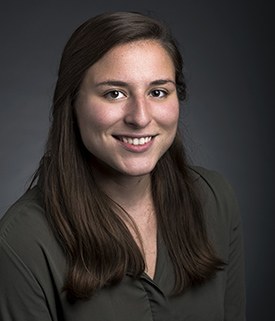
Anna Scolese, MPH student
On Pursuing a Passion for Public Health, Finding a Mentor, and Studying Intimate Partner Violence
Anna Scolese is earning a Master of Public Health at Mason while working as a researcher at the Fors Marsh Group, researching military health and well-being. As a graduate research associate at Mason, Scolese works closely with her mentor Dr. Jhumka Gupta in studying social epidemiology. Scolese spoke about why she chose to pursue public health, her research, and her outstanding experience at Mason.
Why did you choose a Masters in Public Health?
I was always interested in epidemiology. My freshman year of high school I read the book The Hot Zone. I became infatuated with infection disease and looked into in undergrad and finally discovered what epidemiology was and decided that an MPH would be the best way to [achieve my goals] because you can get a global or domestic perspective on it as well.
How would you describe your experience here at Mason?
My mentor Dr. Gupta has really helped shape my career and my time here at Mason. Before I thought epidemiology was only infectious disease and she opened my eyes to social epidemiology and this whole new world of how health impacts people. She has always been so supportive in pushing me in a different direction that I originally thought and has really made the experience wonderful.
What would you share with someone considering pursuing an MPH?
Public health is all encompassing. People may not realize that what they are doing in their day-to-day life has an impact with public health. When you see signs in your elementary school about hand sanitation, you don’t realize that is a public health awareness campaign in and of itself. Any aspect of your life is impacted by public health, whether it be social, disease in general, chronic disease, infectious disease, how you’re interacting with people, where you grew up—all falls into the realm of public health. It’s a huge issue and I think people are just now realizing how multi-faceted public health truly is.
What would you say to a possible MPH student who’s interested in Mason?
If you are looking for a welcoming environment that is a little smaller than some of the other schools, Mason is the place to go. Every professor I’ve ever met is so invested in making sure their students succeed and there is not one professor I’ve met that I’ve had a bad experience with. Even if they are not doing work on the topic you’re interested in, they are more than happy to help you out and find connections. I’ve never had a professor who hasn’t been whole-heartedly invested in making sure the students are successful.
How have you applied the skills and knowledge you’ve gained thus far?
Even some of the small things you learn in class you don’t realize how helpful they can be. Even just getting writing skills in every class will be so vital to your everyday life. Not everyone likes to write papers or briefs—but it’s so common especially in public health to have to write—even if it’s doing a literature review for someone and being able to communicate your findings to someone. All of the classes are designed to help you in some way – even if at the time you don’t think it will apply.
How has the research you’ve conducted as a student informed your career and your interest in moving forward in public health?
Before Dr. Gupta, I really did not have a sense of social epidemiology. The first project I worked on with Dr. Gupta was assisting in writing a paper on intimate partner violence among low income women in Mexico City and child school attendance using latent class analysis. I was nervous to write a paper for the first time, but she encouraged me along the way and introduced me to this topic which I became passionate about. Following that project, I also worked on an endometriosis study, to examine stigma these young women face, and ways to help combat that. I also am currently working on a paper for intimate partner violence and online dating violence. I also assisted on Dr. Gupta's project for the MAPS clinics, looking at health outcomes among immigrant women. All of this while it may not seem related, my eyes to the breadth of epidemiology beyond infectious and chronic disease. Dr. Gupta helped me find my passion for social epidemiology and understanding how social determinants have such a big impact on public health.
Tell us more about your research on intimate partner violence in Mexico City and what you learned about the impact of violence on families and the community as a whole?
The research I worked on with Dr. Gupta and the paper we wrote was about intimate partner violence and how it affects child school attendance. Using baseline data from a study Dr. Gupta has conducted previously in Mexico City, we surveyed low-income women to gain a prevalence of how many women had experienced IP violence and ask questions about child school disruption. From that, we conducted latent class analyses to look at how the patterns of violence experience might impact child school attendance differently -- which showed that women who experience high physical and high sexual violence as well as high physical and low sexual violence – their children were more likely to miss school. A lot of people may not realize that [the abuse] is “happening” to one person but it’s really impacting the whole family.
